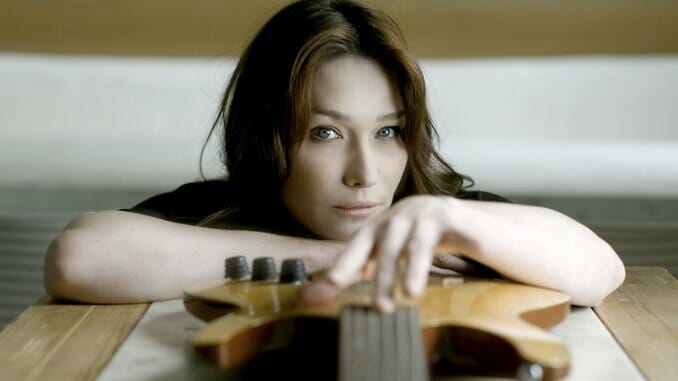Carla Bruni: Escaping the City and Finding Inspiration
Photo courtesy of the artist
Carla Bruni wasn’t planning on composing her eponymous new sixth album this year. But the coronavirus and its ensuing worldwide lockdown forced her suddenly idle hand. Left to her own creative devices in the French countryside with her husband—former president Nicolas Sarkozy—what else did she have to do but carefully construct the breezy, Francoise Hardy-rustic gift to post COVID-19 society that the project became? And the disc is mostly sung in French—her second such outing—for a specific reason, the Italian-born ex-supermodel elaborates. “French writing is so much more appealing for a songwriter because you have so many adjectives, so many more ways to say the same thing,” she says. “Your president now only has, what? Two or three words of vocabulary, doesn’t he? Words like ‘Amazing’ and ‘Great’.” True enough, sadly.
But Bruni, at 52, is perhaps the walking, talking personification of the old adage ‘Not just another pretty face.’ Born in Turin to classical-musician parents, she put her love of songwriting on hold in 1987 for a profitable 10-year modeling career, during which she dated rock stars like Mick Jagger and Eric Clapton. By the time she married Nicolas Sarkozy in 2008, she’d already issued her debut disc Quelqu’un m’a dit and two followups, and she ardently pursued her craft during the rest of her husband’s five-year term in office. She also had her own private office in and staff in the Elysee Palace, and she frequently traveled the globe with Sarkozy, meeting countless heads of state, celebrities, and even Nelson Mandela and the Dalai Lama (during which time she often feared for her life, she recently revealed—heavy lies the head that wears the crown).
The singer has only grown sharper, more delicately restrained with time. Carla Bruni—thematically following 2013’s Little French Songs—is a gorgeous, smoke-wispy acoustic construct that could placate the most savage pandemic beast, from its toe-tapping opener “Quelque Chose” to the piano waltz “Un Grand Amour,” a hypnotic “Les Separes,” and the hip-hop-looped “Voglio L’amore,” performed with her sister, Valeria Bruni-Tedeschi. “I was very much inspired when I wrote the album this year, but not really by the COVID,” she says. “Just inspired in general, and I really don’t know why. Sometimes you just get inspired for some strange reason.”
Paste: You probably have dozens of important people on your speed dial these days. Who have you found yourself consulting with lately?
Carla Bruni: When the pandemic went down? Well, to tell you the truth, I talked a lot with my man [Nicolas Sarkozy] because he’s always very wise and very calm in these kinds of situations. So I was relying on him. And he said to me, “Let’s leave the city. Now.” And I said, “Are you sure?” We’d just had elections, and everybody was living in a normal way. And he said, “We have to leave now,” and it was before the lockdown. I thought things would be cool, but he said, “No, it’s not cool at all. They’ve closed Italy, they’ve closed China, and everything is going really wrong. But take some of your work so you can continue to work.” So that’s what I did. I got my microphones, my guitar, and I left. And he was so right. I was actually glad that I left, because it just turned really bad. It was crazy. It was one of the most crazy moments of our lives.
Paste: Where did you go?
Bruni: We went to the South of France with everybody, my family and our children. We have five children, but four of them are adults. My son is the youngest of the adults, and he’s 19, so he was with us. But the others were not, and one of them was in Paris with COVID-19, and we were very worried. But he was only 30 years old, so he didn’t have it so bad. But we went down to the South of France, and my mother was there, and my sister was there. And oh, my God! I did so many years of therapy, so what about living with your mother when you’re 50 years old, stuck in a house? I was like, “I can’t believe I have to live with my mom again! My poor husband!” Because we’re Italian, you know, and we talk very loud and we talk a lot. So sometimes I could see that he was getting really tired of it. And your mother still thinks you’re 12, even when you’re 53 and you’ve established your own life and you’ve been working since you were 18. I was like, “Stop hounding me!” She was giving me different bits of advice, even advice about the house. Because usually, members of the family would be there separately, but we were all there together this time.
Paste: But I’m betting you had some good discussions with your mother and sister.
-

-

-

-

-

-

-

-

-

-

-

-

-

-

-

-

-

-

-

-

-

-

-

-

-

-

-

-

-

-

-

-

-

-

-

-

-

-

-

-








































